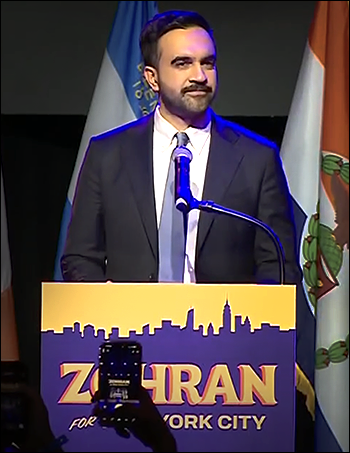By Jim Ellis — Wednesday, Nov. 5, 2025
Elections
Last night’s election results yielded victories for Democrats across the board and it appears that high prices and the state of the economy are among the top reasons.Of course, Democrats will argue that their attacks against President Trump compared to the election results is a rejection of the current administration, and the votes provide evidence for such a claim, but New Jersey and New York City are heavily Democratic enclaves, and the Washington, DC metropolitan area, including the Northern Virginia and Maryland suburbs have repeatedly proven itself as the most anti-Trump region in the country.
Therefore, within the partisan context, the election results should not be considered overly surprising.
New York City
As expected, state Assemblyman Zohran Mamdani (Democratic/Working Families) was elected Mayor of New York City last night, capturing what looks to be a bare majority of the vote.
In the end, it appears the self-described Democratic Socialist outpaced former Gov. Andrew Cuomo (Fight and Deliver Party), and Curtis Sliwa (Republican/Protect Animals Party) by a 50.4 – 41.6 – 7.1 percent margin. Polling did not fully capture Mamdani’s strength, nor Republican Sliwa’s weakness. In particular, the latter man polled approximately ten points better on average than his ultimate performance.
Certainly, barely going over the 50 percent mark gives Mamdani the mandate he needs to implement his more radical agenda, and certainly will have support to do so from the New York City Council. Much more to come in the ensuing weeks about this result and the new Mamdani Administration.
New Jersey
This gubernatorial election outcome was one of the most surprising decisions of last night as Rep. Mikie Sherrill (D-Montclair) scored what will likely be a 56-43 percent win over 2021 Republican gubernatorial nominee Jack Ciattarelli despite polling that suggested the race was falling into the toss-up range.
The Sherrill victory represents the first time a political party has won three consecutive New Jersey gubernatorial elections since World War II.
With the Congresswoman’s victory, we will see another special congressional election, this time in her 11th District seat. Sherrill will resign from the House shortly before she assumes the Governorship in mid-January. One of her first duties will be to schedule the special election for voters to elect her successor. Already vying for positioning are former NJ-7 Congressman Tom Malinowski (D) and several local Democratic officials.
Virginia
Polling in this race was spot on, as survey research firms were not only consistently projecting an Abigail Spanberger victory, but they also saw the surge for the Democratic candidates in the final week of early voting and on Election Day. The combination carried not only Spanberger, but also Lt. Gov.-Elect Ghazala Hashmi and Attorney General-Elect Jay Jones to victory as part of the Democratic sweep.
The most surprising result was Jones defeating AG Miyares after the controversy broke several weeks ago about him fantasizing about killing his Republican opponents. Much analysis about the Attorney General’s result will be forthcoming over the next period of days when the actual results can be digested.
California Proposition 50
As expected, last night Golden State special election voters easily adopted the referendum to replace the California Citizens Redistricting Commission congressional map with a plan that Gov. Gavin Newsom had drawn. The redraw gerrymander could net the Democrats five seats and reduce the Republicans to four of the state’s 52 congressional districts.
Whether the map actually produces such results remain to be seen in the 2026 election. We can expect to see legal challenges to the entire process to soon be forthcoming but with a strong public vote, overturning the new map becomes very difficult.
TX-18
The jungle primary for the third of four special congressional elections to fill vacancies was held in Houston last night. The results will go to a runoff election that Texas Gov. Greg Abbott (R) will schedule as soon as the Secretary of State verifies that no candidate received a majority of the vote.
The verification will come quickly, since Harris County Attorney Christian Menefee (D) and former Houston City Councilwoman Amanda Edwards (D) placed first and second with 32 and 25 percent of the vote, respectively. Therefore, no one came close to obtaining majority support.
The problem for whoever wins the runoff election, which will likely be in January, is that he or she will have to turn around and participate in a March 3, 2026, primary in another version of the 18th District and against incumbent Rep. Al Green (D-Houston) under the new Texas congressional map.
The Democrats are assured of keeping the 18th District seat to replace the late Rep. Sylvester Turner (D-Houston), but the prize may be short-lived because the regular primary in the new district will be just weeks after securing victory.







